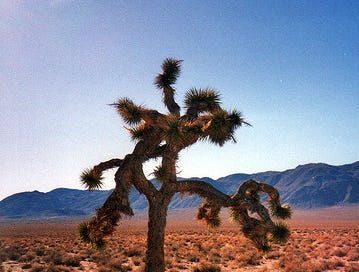Behold a new (irregular) series! I listen to lots of music but I’m not ashamed to say there are gaps in my listening history. Here, I am trying to fill in some of those potholes. I’ll sprinkle the AISHLTBN posts in among my new music writing.
When U2’s ‘The Joshua Tree’ was first released (in 1987), my listening tastes were very much elsewhere… And since then, the tide of time and the vast waves of new music washing over me daily have meant I never listened to the album in full. Of course I’m very familiar with some of the tracks, but not with the front-to-back curated listening experience of the whole record.
‘Where The Streets Have No Name’ has always been one of my favourite U2 songs — but here, it somehow sounds 10-times better. Perhaps one of the strongest album openings of all time: the very, very well-judged build from subtle synths to full blown band jam works stunningly well as a solid bookend to a long listen. That buzzy, slightly over-amped bass guitar line, innovative guitar work from The Edge… what a combination. (For a really fascinating breakdown of the song, check out series 7 of the Strong Songs Podcast by Kirk Hamilton.)
The next two tracks remain in familiar territory: ‘I Still Haven’t Found…’ has a distinctively similar sound palette but also feels subtly ramped up. It gets down to business more quickly but still feels measured and gorgeously lush. Listening this time, with proper attention, I’m enjoying the myriad guitar additions — sometime brief sparkles of variation. And then the use of acoustic guitar about halfway in really adds to the rhythmical progress of the track. Then, what a great transition to the bass-driven tones of ‘With Or Without You’, set off by haunting, ethereal and quite experimental guitar sounds.
So far, so familiar, but I’m appreciating the wider context and the broad landscape U2 are painting, playing the long game.
But now, after a long fade out (I miss those) it’s into more uncharted territory. I can’t say I remember hearing ‘Bullet The Blue Sky’ before. It’s more ragged, harsher, with a firm and rebellious feel. Sitting here in 2025, it’s amazing how relevant it feels in some ways, although it’s also tempting to hear something a little dated in the sound. Inevitable and no judgement on the creative vision being expressed in ‘87. The song’s perhaps a little long but the guitar solos hold my interest.
‘Running To Stand Still’ is a lull. It wouldn’t stand up to much as a single release, but here it works reasonably well to provide a lower energy moment of calm. It’s a lovely song, and the organic piano sound feels very welcome at this point, despite the drain of energy. ‘Red Hill Mining Town’ is also new to me and, after the first 30 seconds which feel a little uncertain, I have to say I like it. The song settles into a satisfying groove, and Bono pushes his voice towards a fervent tone. Better late than never when you discover a great song.
For some reason I can’t warm to ‘In God’s Country’, though — I can see the quality of the song but all this imagery of “desert skies” and “naked flames” feels a bit tired by now. Combined with ‘Trip Through Your Wires’, I can’t help feeling this part of the album isn’t fully credible. It’s just a little bit too faux-desert-Americana. The music is solid and Bono sounds fantastic, but it lacks a certain depth.
‘One Tree Hill’ seems to attain a better balance. It’s on theme but also true to the U2 persona and palette. I like the shuffly feel, the warm harmonies in the choruses, and those whirring, flanging guitar sounds between the stripped-back verses. The song ends with a slow, acapella section which feels like a good album close… but there’s more! ‘Exit’ is an interesting song: it rises and falls, builds and backs off again; indeed there is a strong sense of an exit approaching, but in its own correct time. A buzzy bass is a fitting way for the song to fade away.
Finally, ‘Mothers of the Disappeared’. A dramatic title; and a fairly dramatic song. A very long and slightly self-indulgent build eventually reveals some proggy guitar work and unusual instrumentation, and a tortured-sounding Bono. It feels deliberately intended as an epic and thoughtful close.
This is undeniably a very good album now in 2025 — despite some flaws particularly in the second half — and it certainly ranks as a great one in the 1987 context. I’m glad I’ve finally caught up with it, putting those oh-so-familiar songs into a proper context.





